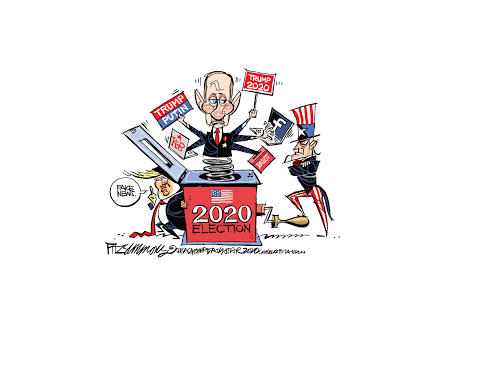Experiencing Campaign 2020: Don't Take Reality for Granted

Let's face it: except for Peter Sellers' Dr. Strangelove, the Cold War wasn't a barrel of laughs. From hair-raising crises set off by its nuclear balance of terror to proxy wars in countries most Americans couldn't find on a map, Washington's competition with Moscow didn't offer much comic relief. If there were any giggles, they came from Soviet propagandists whose copy sometimes supplied one-liners for cartoon characters like Boris Badenov or Bob Hope's comedy routines. Funny or not then, their successors are giving Vladimir Putin the last laugh as his disinformation warriors gear up to mislead Americans in the 2020 election campaign.
That Putin is good at pulling our chain isn't an accident. Russian apparatchiks have been perfecting political warfare for a century at home as well as abroad. It didn't always go well. In Soviet days, Russians expected their government to misinform them. Pravda(masthead pictured below) and the other broadsheets had huge print runs, but not because the communist party's daily was a must read. In an economy where scarcity was the only staple, toilet paper shortages made current subscriptions a must. "What's more useful, newspapers or television?" a Russian asked. "Newspapers," his comrade said. "You can't wrap herring in a television."

Not surprisingly, after 70 years of a Bolshevik fantasy land, the post-Soviet generations are no less skeptical than their parents and grandparents about what they hear, see and read. For one thing, poverty and a struggling economy, the aftermath of the Marxist-Leninist ideology touted by the communist party's flacks, surround them. So, does the old system's authoritarianism as evidenced, among other things, by Putin's mugging of Russia's all-too-briefly independent press. Now owned by his chosen kleptocrats, the media's loyalties remind contemporary Russians why it's important to read between the lines.
Russia's history is relevant to Americans today. In the 2016 election, Putin's political warriors unleashed a massive media offensive to mislead, divide, inflame, and influence voters. His favorite in the race was hardly a secret and this year President Trump seems intent on doing everything he can to prepare the battlefield for the Kremlin's on-line armies to attack once again. Indeed, his campaign looks like a chapter from a Putin propagandist's playbook. Approaching 20,000 falsehoods since taking office, of course, Trump's nonstop lies are a given. But with his repertoire expanding in scope, the lies are not only creating an alternative reality for Putin to exploit. They are endangering American lives and security as well.
The national health crisis is the immediate case in point. Trump's repeated contradiction of the messages from public health leaders—backhanding their calls for careful economic reopening as well as personal precautions—is dividing Americans. The political impact couldn't be clearer: even as infections and deaths from the coronavirus climb dramatically, two-thirds of Republicans polled recently believe the worst is behind the country, compared to three-quarters of Democrats who see the biggest challenge ahead. The effect of Trump's lies: the disease and the partisan split are growing, as is room for their exploitation by Putin's trolls.
As troubling, as Americans and their leaders work to confront the challenge of racism, Trump is peddling inflammatory fabrications that would have done Stalin's political flacks proud. During the Cold War, Soviet propagandists worked hard to portray the United States as a country in turmoil whenever difficult social issues arose. The effort continued their covert and overt campaigns begun in the 1930s to deepen American divisions while advancing Moscow's cause. As a KGB officer, Putin knows his history. In meddling four years ago, his trolls did the same in 2016, seeding social media with racist posts from bogus far right and left wing groups.
To Russian political warriors, Trump's fantastical claims that radical mobs are taking over the streets have a welcome ring that doubtless makes them put down their pens and smile. They know well that, whatever American social and economic shortcomings, discrediting a democracy when its political leaders and public opinion are facing up to its problems is a heavy lift. But when a president makes his campaign message his fictional struggle against non-existent extremists, rather than racial injustice, the trolls tweeting from Moscow can rest easy. They just need to go along for the ride.
The Trump campaign, of course, faces real world challenges. From the resurgent pandemic to the economic recession, fielding alternative facts or blatant falsehoods won't make them go away. Russia also figures prominently. As intelligence and homeland security officials reprise their warning from 2016, Trump again is calling Moscow's election meddling a hoax. Add to that his inexplicable behavior in turning a blind eye to Russia's targeting of US forces in Afghanistan. Trump's claim that this, too, is a "hoax" only deepens questions about his deference to Moscow that White House as well as campaign officials prefer to ignore.
In a fascinating essay last year, Peter Pomerantsev, a Russian-born journalist and television producer, saw Trump's 2016 election victory as a reflection of what Putin had developed and refined in his rise to power two decades before. Like Putin, he wrote, for Trump facts didn't matter. "The wild relativity that claims all facts are subjective or impossible to ever know; the nebulous nostalgia; the replacement of ideology with infinite layers of conspiracy theories; the flooding of the information space with so much bullshit you can't tell truth from fiction." Pomerantsev concluded, "It was all hauntingly familiar."
Pomerantsev offers another lesson from Russia. So far in the 2020 campaign, Trump's rhetoric fits well not only with Moscow's longstanding themes, but also—as Pomerantsev puts it—the 21st Century's propaganda of unreality. The pandemic, the problem of racial injustice, and Russia's political warfare are real. November will tell whether Americans know the difference.
Photos courtesy of Kent Harrington
Click the social buttons to share this story with colleagues and friends.
The opinions expressed here are the author's views and do not necessarily represent the views of MediaVillage.com/MyersBizNet.



